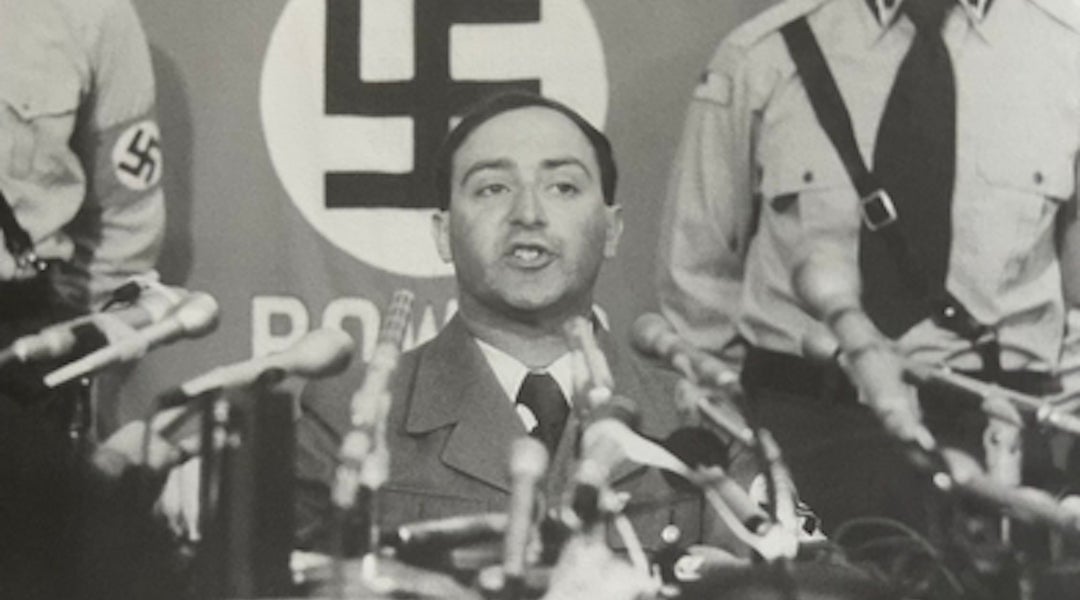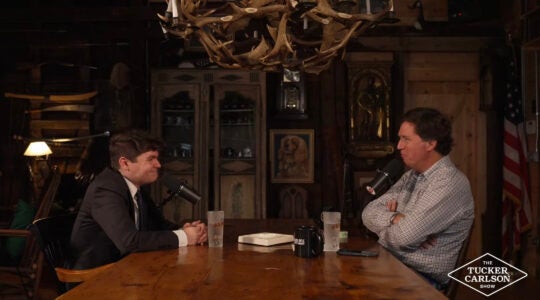(JTA) — In 1977, the leader of the Nationalist Socialist Party of America, Frank Collin, announced a march through the Chicago suburb of Skokie, Ill. While a neo-Nazi march would be controversial under any circumstances, the fact that one out of six people in Skokie were Holocaust survivors made it even more provocative. Chicago authorities took steps to prevent it, including requiring the NSPA to post $350,000 worth of liability insurance in case any damage occurred. Authorities also banned the display of Nazi images, explaining that the violence that might have been incited overrode free speech protections.
The dispute drew national attention. After the march was initially cancelled, the ACLU took up the case at the urging of Jewish lawyer Joseph Burton, who defended the NSPA’s right to freedom of speech and assembly. Victor Rosenblum, a professor of law at Northwestern University and past chairman of the Anti-Defamation League’s Chicago branch, made the counter-argument: “The Nazis’ march in paraphernalia is a reminder of the most destructive movement in history. They stand for the destruction and wiping out of human beings. This is not constitutionally protected.”
An initial court ruling said the NSPA could march in uniform but not display the swastika, finding that the symbol constitutes “fighting words” unprotected by the Constitution. The court also upheld the liability insurance requirement, despite the fact that it effectively would have made the rally unfeasible. The case was challenged in the Supreme Court in 1977, which declined to overturn the lower court ruling but instructed the state of Illinois to “provide strict procedural safeguards” if it moved to limit free speech.
In January 1978, the Illinois Supreme Court decided that the NSPA march was constitutionally protected, including the right to wear swastikas, ruling that “the display of the swastika, as offensive to the principles of a free nation as the memories it recalls may be, is symbolic political speech intended to convey to the public the beliefs of those who display it.” In February, a federal court went even further, ruling that the ordinances intended to prevent the march were unconstitutional.
The NSPA march was held on June 25, 1978, though the march never materialized. About 20 or so Nazis congregated for only ten minutes, and throngs of Jewish and other groups drowning out their voices. Jewish organizations planned counter marches not only in Skokie, but in New York City and other places.
Meir Kahane also held a rally in 1977, after the initial cancellation but prior to the court rulings permitting it to go ahead. Kahane urged a crowd estimated at 400 to “kill Nazis now” and to arm themselves, exhorting them: “Every Jew a .22.”
President Carter also issued a statement: “I must respect the decision of the Supreme Court allowing this group (the Nazis) to express their views, even when those views are despicable and ugly as they are in this case. But if such views must be expressed, I am pleased they will not go unanswered. That is why I want to voice my complete solidarity with those citizens of Skokie and Chicago who will gather Sunday in a peaceful demonstration of their abhorrence of Nazism.”
JTA has documented Jewish history in real-time for over a century. Keep our journalism strong by joining us in supporting independent, award-winning reporting.






